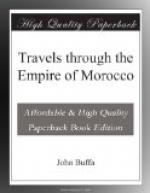After wandering about for some time, stirring up the minds of the people to revolt, Muley Arshid fled to the mountains of Rif, where he offered his services to the Sovereign of those districts, who, unfortunately discovering the abilities of the stranger, confided to him the administration of his territories, when, after having by stratagem and prodigality gained the troops and the people to his interests, he dethroned and inhumanly butchered his royal benefactor. He then defeated his brother Mahomet, and closely besieged him in Tafilet, whence that good prince died of grief. To enumerate the bloody exploits of this prince would extend my letter to a volume; suffice it therefore to say, that his reign was short, and the remembrance of it never to be effaced. He died in 1672 of a fractured skull, in consequence of a fall from his horse.
He was succeeded by his brother Muley Ishmael, who distinguished himself by some brave actions; and his reign would have formed a grand epoch in the history of this country, had he not stained it by a succession of tyranny and cruelties, too shocking to dwell upon. He died in 1727 at the advanced age of eighty-one, leaving behind him a numerous offspring. This prince, in order to ensure his despotic and arbitrary power, contrived to form a regular army of foreign soldiers, which he effected, partly from the negro families, then settled in Barbary, but principally from a vast number of blacks which he obtained from the coast of Guinea.
Muley-Achmet-Daiby, one of the numerous sons of Ishmael, ascended the throne of Morocco, and, after reigning two years, died of a dropsy. His successor, Muley Abdallah, by far surpassed all his predecessors in point of vices and cruelty. His conduct was so flagrant, that he was deposed no less than six times, but as often re-elected. Amidst civil wars, divisions, and devastations, the plague again made its appearance, and committed the same dreadful ravages as in the reign of Ishmael. Being reinstated for the sixth time, Abdallah took advantage of the troubles occasioned by this terrible disease, to excite divisions among his negro soldiers, by whose power alone he had suffered all his humiliations. Vast numbers of this warlike race fell the victims of his treachery, and he succeeded in reducing them so low, that they were no longer a subject of dread to him. Having thus freed himself of all cause of restraint, he recovered his power, and, if possible, plunged deeper than ever into the gulf of iniquity; and each succeeding day was stained with crimes of the blackest hue. The only sentiments with which he inspired his unhappy people were those of terror and disgust. At length, worn out with age, he died at Fez in 1757; and was succeeded by his son Sidi Mahomet, who had begun to reform several abuses, during the latter part of his father’s reign, when he had been entrusted with the government of Morocco.




